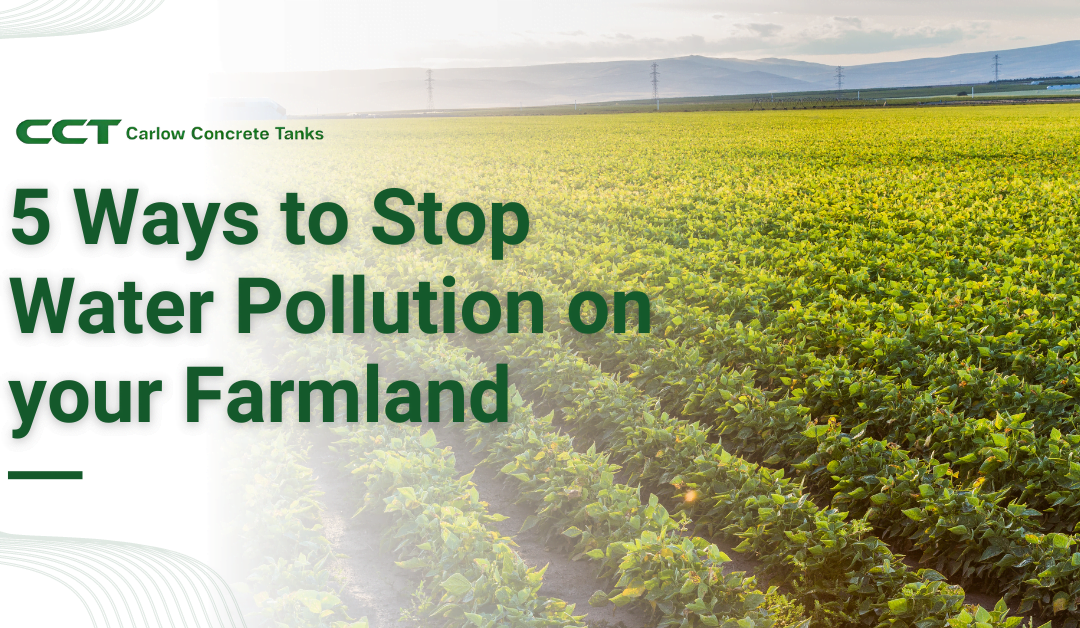A successful agricultural industry relies not only on profitable crops and livestock, but also on clean farmland and waterways. When agriculture operations are not managed effectively, they can result in the release of pollutants into waterways. This can have a serious impact on aquatic life, public health, and the economy. Farmland operators have a responsibility to prevent water pollution and protect waterways from the negative impacts of agriculture. In this article, we will discuss how farms pollute water and provide 5 tips for reducing water pollution on your farm.
1. Use Cover Crops to Prevent Soil Erosion
Soil erosion is a major problem on farmland, and it can contribute to water pollution. Erosion occurs when the top layer of soil is washed away by water or wind. This can happen if the ground is left bare, or if there is not enough vegetation to hold the soil in place. Erosion can also occur during farming operations, such as when tilling or plowing.
One solution to prevent soil erosion on farmland is to use cover crops. Cover crops are plants that are intentionally sown in farmland between regular crop cycles, often during the off-season. These crops protect and strengthen the soil, preventing erosion by holding it in place with their roots and providing cover from wind and rain. In addition, cover crops can improve the fertility and water retention of the soil, leading to healthier crops and higher yields for farmers. Increasingly, agriculture professionals are recognising the benefits of using cover crops as a preventative measure against soil erosion on farmland. While there may be an initial cost for farmers to plant and maintain cover crops, the long term benefits for their farmland make it a valuable investment.
2. Use Fertilisers and Pesticides Carefully
Fertilisers and pesticides are essential for agriculture, but if they are not used carefully, they can pollute water. When fertilisers and pesticides wash off of fields, they can end up in lakes, rivers, and streams. This can lead to a process called eutrophication, which is when a body of water becomes overly enriched with nutrients. Eutrophication can cause problems for plants, animals, and humans. It can also lead to the growth of harmful algae blooms.
To prevent water pollution from fertilisers and pesticides, farmers should use them according to the instructions on the label. They should also avoid using them near waterways. If possible, farmers should use slow-release fertilisers, which release nutrients more slowly and are less likely to wash off of fields.
3. Chemical Handling
It is important to properly store and handle agricultural chemicals in order to prevent water pollution on your farmland. When not stored safely, these chemicals can seep into local water sources and contaminate them for both human and animal use.
In order to prevent this type of contamination, farmers should use tightly sealed containers when storing agricultural chemicals, dispose of excess chemicals according to regulations, and avoid applying these substances around water sources or during rain storms.
4. Manure Management
As farmland becomes increasingly industrialised, the management of animal waste becomes a major concern for water pollution prevention. Improper disposal or storage of manure can lead to the release of harmful bacteria and nutrient runoff, leading to contaminated drinking water and eutrophication in nearby rivers and lakes.
That is why it is important for farmers to have a plan in place for managing manure. This can include regularly testing and treating waste, using manure as fertiliser in fields rather than letting it sit in lagoons, and properly storing waste to prevent runoff during heavy rains. By taking steps towards responsible manure management, we can prevent water pollution and preserve the health of our ecosystems.
5. Managing Irrigation
In farmland, irrigation is essential for the growth and success of crops. However, improper irrigation can have a negative impact on the environment and lead to water pollution. Runoff from farmland can contain fertilisers and pesticides that contaminate nearby water sources. This can lead to harmful algal blooms and jeopardize the health of plants, animals, and even humans who consume contaminated water.
By implementing a wastewater management system farmland operators can reduce water loss and runoff, thus preventing pollutants from entering nearby water sources. This can also help to recycle water for irrigation purposes, making farmland more efficient and environmentally friendly. In addition, avoiding irrigation during periods of high rainfall can prevent additional erosion and contamination of water sources.
By taking proper precautions with agricultural operations, farmland owners can ensure they are protecting their land and water resources for future generations. Additionally, having regular water tests conducted on your farmland can help determine if pollutants are present and how they may be controlled or eliminated. By taking the necessary precautions, farmers can protect their farmland and surrounding environment from the negative effects of water pollution caused by agricultural operations.
An industry leader in agricultural tanks across the UK & Ireland, Carlow Concrete Tanks provide precast concrete products & custom solutions for different agricultural purposes.
Contact Us today at sales@carlowtanks.com to learn how we can help you prevent water pollution on your farmland.

